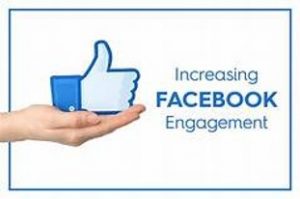
Why is Facebook Engagement important and how to INCREASE it!!
March 24, 2020 2:35 pmFacebook Engagement
 Facebook engagement is any action someone takes on your Facebook Page or one of your posts.
Facebook engagement is any action someone takes on your Facebook Page or one of your posts.
The most common examples are likes , comments, and shares, but it can also include checking in to your location or tagging you in a post.
Facebook engagement matters because it can help extend organic reach. First, engagement helps boost your News Feed placement based on the Facebook algorithm.
And second, likes and shares expose your posts to your audience’s extended network. Chris Potter Golf found that each like or share extended their reach to six or seven new people. That’s a lot of extra exposure at no extra cost.
Finally, engagement also indicates that your audience is, well, engaged. And an engaged audience that wants to interact with your brand is something every marketer should aim for.

Our TOP 10 Tips for you
-
Teach, entertain, inform, or inspire
Your Facebook audience is not looking for a sales pitch, and they’re certainly not going to engage with one.
They want to engage with content that will make them smile, make them think, or improve their lives in some way.
To create content that connects with fans, you’ll need to…
-
What you find entertaining or inspiring is not relevant.
When you’re seeking engagement, it’s your audience’s wants and needs that matter.
And it’s tricky to understand what those wants and needs are unless you really understand who your audience is.
Facebook Page Insights provides a ton of useful information about your audience. Study this information carefully, and look for any unexpected details that could help you create a more meaningful connection with fans.
so crucial to understand your audience – their wants / needs / interests etc
-
Keep it short & Good Quality
The vast majority of people use Facebook mobile devices—a whopping 88 percent of them.
Facebook’s data shows that people scrolling through News Feed on their mobile devices spend just 1.7 seconds to consume an item of content.
Even people browsing on a computer only spend 2.5 seconds per content item.
The good news is that people can recall content after seeing it for just 0.25 seconds. But you need to act fast to get their attention.
Keep your post short and sweet to capture attention quickly and entice users to stop scrolling and engage.
Quality is key too – doesn’t need to be complicated – just keep it to the point (enough said).
-
Use (great) images (that are recognisable)
Facebook posts that include a photo see higher-than-average engagement rates. Simple shots work well. Facebook suggests a product close-up or a customer photo.
You don’t need a fancy camera or photography equipment—your mobile phone is all you need to get started.
-
Make a video, or broadcast live
Video posts seeeven higher engagement than photo posts. Like photography, videography can be simple and inexpensive, and you can get started using your mobile phone.
Keep in mind that vertical video gives you the most screen real estate on mobile devices.
Live videos see the highest engagement of all, getting six times more interactions than regular video posts. Can’t think of a reason to go live? Get creative.
-
Ask a question
An interesting question is a great way to kick off an active comments thread. Here are some ideas to get you started.
- How do you [complete this action]?
- Why do you [like this event or brand]?
- Do you agree with [a notable statement, event, person, etc.]?
- What’s your favorite [fill in the blank]?
People just love to share info back ( for free too) And when they respond make sure you reply, No one likes to be ignored – if they have taken the trouble to respond make sure you talk back!
7. Post consistently and at the right times
From the analytics section, Facebook understand when your audience is online and engage with them regularly – scheduling posts can help with this. Your audiences comes to expect to see content from you regularly. Over time you will determine how often you should past to get the best response from fans, but Facebook recommends posting at least two or three times per week.
8. Boost your Facebook posts
Boosting a post is a simple form of Facebook advertising that allows you to get your post in front of more people, and thereby increase your chances of engagement. Also adds to your organic engagement too. Obviously Facebook likes when you BOOST as it monetizes what they do – but it does work as you can target your audience and also track the effectiveness.
9. Avoid engagement bait
This a new one for me – and always good to keep up to date as Facebook regularly changing the rules.
When you’re hoping for likes and shares, it might be tempting ask for likes and shares. Don’t do it! Facebook considers this engagement bait and will penalize you by downranking your posts in the Facebook algorithm.
As mentioned above, it’s fine to ask a genuine question, or ask your followers for their opinion or feedback. You cross the line when you ask for a comment that doesn’t indicate any real thought or consideration. Here’s are some examples of engagement bait:
- Vote Baiting – eg avoid votes that are obvious no brainers
- React Baiting – eg avoid LIKE this if you Love this
- Share Baiting – eg avoid SHARE with 10 friends to WIN a £1M
- Tag Baiting – eg avoid TAG freinds who like ???
- Comment Baiting – eg avoid type YES if you like Food !!!
All above are too simple and wont interest your facebook audience or Facebooks alogrithm
10. Add a Call to action Button
A call-to-action button gives people Facebook engagement options beyond liking, sharing, and commenting.
- Your CTA button can ask viewers to:
- Book an appointment
- Contact you (including through Facebook Messenger)
- Watch a video
- Click through to your website
- Shop your products or see your offers
- Download your app or play your game
- Visit and join your Facebook Group
Tags: beccles marketing, facebook advertising, facebook engagement, norfolk marketing agency, social media marketing, suffolk marketing agency
Categorised in: Blog
This post was written by BeaMarketing
